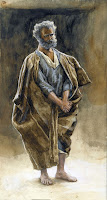
December 26
The epistle of today contains a short account of the life and sufferings of this saint. It only remains to be added that, on account of his virtues, his wisdom, and his zeal for the faith, the apostles thought him worthy to be chosen the first of the seven deacons, whose office it was, in addition to the preaching of the word of God, to serve the poor, and properly to distribute the alms of the faithful.
The Introit says:
"Princes sat and spoke against me, and the wicked persecuted me;
help me, O Lord my God, for Thy servant was employed in Thy justifications.
Blessed are the undefiled in the way, who walk in the law of the Lord."
help me, O Lord my God, for Thy servant was employed in Thy justifications.
Blessed are the undefiled in the way, who walk in the law of the Lord."
Glory be to the Father, and to the Son, and to the Holy Spirit. As it was in the beginning, is now, and ever shall be, world without end. Amen.
Prayer
Grant us, we beseech Thee, O Lord, to imitate what we honor, that we also may learn to love our neighbors, as we celebrate the feast of Him Who knew how to beseech even for Hili persecutors, Our Lord Jesus Christ, Thy Son, Who, etc. Amen.
Epistle: Acts 6:8-10; 7:54-59
In those days Stephen full of grace and fortitude did great wonders and signs among the people. Now there arose some of that which is called the synagogue of the Libertines, and of the Cyrenians, and of the Alexandrians, and of them that were of Cilicia and Asia, disputing with Stephen. And they were not able to resist the wisdom and the spirit that spoke. Now hearing these things they were cut to the heart, and they gnashed with their teeth at him. But he being full of the Holy Ghost, looking up steadfastly to heaven, saw the glory of God, and Jesus standing on the right hand of God. And he said: Behold I see the heavens opened, and the Son of man standing on the right hand of God. And they crying out with a loud voice, stopped their ears, and with one accord ran violently npon him. And casting him forth without the city, they stoned him, and the witnesses laid down their garments at the feet of a young man whose name was Saul. And they stoned Stephen, invoking, and saying: Lord Jesus, receive my spirit. And falling on his knees, he cried with a loud voice, saying: Lord, lay not this sin to their charge. And when he had said this, he fell asleep in the Lord.
Instruction
Stephen is unjustly persecuted, yet he prays for his persecutors. Can we excuse ourselves if we do not love our enemies? Were not Stephen, and others who have imitated him, men like ourselves? With the grace of God, could not we do what they have done? Could we call ourselves Christians were we not to do this? No; for the love of our neighbor, and of our enemy also, is the chief token of the Christian; since it is only by this love that we become like Christ, and resemble our heavenly Father, Who makes His sun to shine upon the evil and the good, and sendeth rains upon the just and upon the unjust (Matthew 5:45). Let us, therefore, imitate the love of God, of Christ, and of Saint Stephen, and then we may one day be able to give up our souls with calmness into the hands of our Maker.
Gospel: Matthew 23:34-39
At that time Jesus said to the scribes and Pharisees: Behold I send to you prophets, and wise men, and scribes; and some of them you will put to death aud crucify, and some you will scourge in your synagogues, and persecute from city to city; that upon you may come all the just blood that hath been shed upon the earth, from the blood of Abel the just, even unto the blood of Zacharias the son of Barachias, whom you killed between the temple and the altar. Amen I say to you, all these things shall come upon this generation. Jerusalem, Jerusalem, thou that killest the prophets, and stonest them that are sent unto thee, how often would I have gathered together thy children, as the hen doth gather her chickens under her wings, and thou wouldst not! Behold your house shall be left to you desolate. For I say to you, you shall not see Me henceforth till you say: Blessed is he that cometh in the name of the Lord.
Those in our days who stone and kill the prophets and preachers are those who, by their evil backbiting, defame their pastors, who mock at and despise preachers and sermons; for to the servants of God this is a great torment and source of grief; it destroys their courage and paralyzes their efficiency. On this account it provokes the anger of God, as through the prophets He often told the Jews.
Supplication to Saint Stephen
O Saint Stephen, first of the martyrs, who wast filled with fortitude, grace, and love, whose guiltless face shone like the face of a pure angel, I beseech thee, by the grace which rendered them worthy to see heaven opened and Jesus sitting at the rigbt hand of the Father, that thou wouldst, by thy prayers, procure for me from God a pure conscience, and a holy, meek love, that like thee I may readily forgive those who injure me; may pray for them; may not only desire for them whatever is good, but may do them good indeed, and thereby merit the grace of a happy death. Through Jesus Christ, our Lord, etc. Amen.
-- Goffine's Devout Instructions


